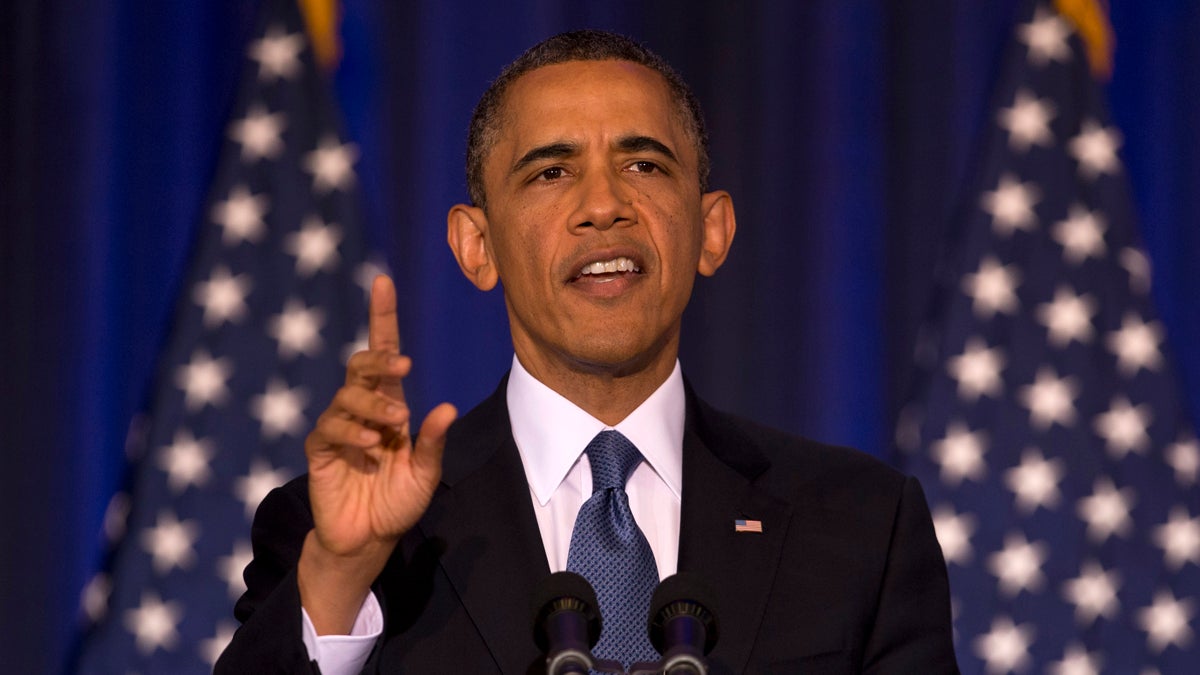Addicted to war, the United States is about due for an intervention

President Barack Obama reacts to a woman yelling at him from the back of the auditorium as he talks about national security on May 23, 2013, at the National Defense University at Fort McNair in Washington. (AP Photo/Carolyn Kaster)
When President Obama spoke in May at the National Defense University in Washington, D.C., he said that continual warfare was unsustainable. But will the United States ever be free of its addiction to war?
It was May 23rd, 2013. I was on my couch, drinking my coffee, watching President Obama on television. He was speaking at the National Defense University in Washington, D.C. In the speech, he said that the nation was at a crossroads. He quoted James Madison, the fourth president of the United States, to make a point about the unsustainability of war.
Madison warned in 1795: “No nation could preserve its freedom in the midst of continual warfare.”
Television commentators talked about the merits of that statement. It sounded more like an intervention meeting for an addiction than a debate.
It reminded me of an incident five months prior, on a surprisingly warm night in December. I had just seen “Zero Dark Thirty,” the thriller about finding and killing Osama Bin Laden, with a bunch of friends. As I walked to my car, I saw an acquaintance from high school. We’ll call him Ted to protect his identity. We weren’t the greatest of friends in school, but we never had any problems with each other. After we graduated, Ted joined the Marines and was sent to Iraq. I hadn’t seen him in years.
Ted waved and walked towards me with a slight limp to strike up a conversation. Apparently we were sitting on opposite sides of the theater and didn’t know it. In talking about the movie, our discussion quickly led to us to his experience in Iraq.
“The movie was awesome,” he said. “It brought back good memories. I remember all the friends that I made out there. It reminded me of who I am.”
“Well, who are you?” I said.
‘Part of something greater’
Ted told me he was a radio operator in Iraq at a time when insurgents were attacking U.S. positions. He was ordered to coordinate missile strikes against these insurgents at the villages that protected them. Unfortunately the missiles killed many innocent women and children — a fact that haunted Ted when he went back to the states. He found escape in LSD, shrooms, and MDMA. He became addicted to the drugs and had to go through a rehab program with the help of a sponsor.
“So those are good memories?” I asked, awkwardly scratching the back of my head.
“No, of course not,” he said. “We shouldn’t have even gone to Iraq. We went there for the wrong reasons. People just want money and power.”
“So then what were the good memories?”
“The people I met. They made you feel that you were a part of something greater than yourself. That you were serving the people of the United States. I want to go back when the time is right.”
I couldn’t help but think of his limp when he said that he wanted to go back. Maybe the injury wasn’t permanent. I didn’t know. It also made me uncomfortable to think of Ted wanting to go back to a situation that caused him to get addicted to illegal drugs. It was time for me to head home. I told Ted that I needed to find something to eat but we should hang out sometime in the near future. It was mostly true, at least the last part.
“You know, there’s an Applebee’s in Iraq…,” Ted said.
I turned back toward him. “A what?”
“… and a KFC, and a Taco Bell.” He was trying to hold me up.
“Is it good?”
“Yeah, it’s Applebee’s”
“I mean, yeah, sure, but do people eat there?”
“Only Americans eat there, and only Americans work there. They only take dollars, so most Iraqis can’t pay for it. It’s messed up. They even replaced a bunch of mosques with churches.”
“Oh.”
“I still want to go back and serve though. When the time is right.”
“Yeah,” I said. “When the time is right.”
Addiction
Fast forward to the present day. I’m at home, and my cell phone vibrates with a Facebook update. It’s an event for Ted. He has a party coming up to celebrate being clean from drugs for one year.
I take a sip of my coffee, turn back to the television. The news media is labeling Edward Snowden, the man who revealed the extent of the NSA’s ability to spy on U.S. citizens, as a spy. Some people comment that there should be a war on whistle blowers, that the U.S. government may need to retrieve him by force.
I think about Ted’s upcoming party. Maybe one day I’ll see the same thing happen for the U.S. government. It’ll be a celebration of not being at war for one year. They’ll have Olivia Wilde, Scarlett Johansson, rock ‘n’ roll, apple pie and beer. I can dream right?
Unfortunately this is reality, where war is an addiction and, like all addictions, it’s unsustainable.
WHYY is your source for fact-based, in-depth journalism and information. As a nonprofit organization, we rely on financial support from readers like you. Please give today.

